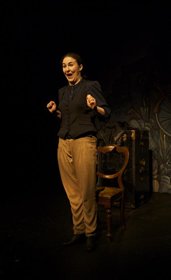It was a tall order for James Joyce to stuff the moment-to-moment significance of a single day into a novel, and it seems an even taller order to try to cram the nexus of persons and events that influenced Ulysses into an hour-long, one-person show. But Donal O’Kelly has made that his mission, all in the effort to, as the narrator of his play asserts, rescue Joyce from the haughty, labyrinthine criticism of stodgy academics. In doing so, O’Kelly leads us along a rather rudimentary path to meet the flesh-and-blood inspirations that, over the course of 1904, sparked Joyce into the eventual writing of a landmark work of twentieth-century literature.
The play was staged in an earlier version in 2004. Entitled Jimmy Joyced!, that version was performed by Donal O’Kelly and directed by Sorcha Fox, and in some ways the current production appears to have inherited some basic elements from that original outing. O’Kelly’s daughter Katie assumes the role of the narrator, one JoJo Staines, a Rathmines stallholder who has inherited his father JJ’s (Donal O’Kelly’s original character) obsession with all things Joycean. The original painted backdrop (by Paula Martin), a candy-coloured music hall fantasia of Dublin landmarks, is put into service once again, and Fox reappears at the helm to direct.
 As the show begins, the lunchtime crowd at Bewley’s Café Theatre is jolted to attention by the hyperactive strains of what sounds strangely like the opening of children’s television show. Katie O’Kelly appears with pilot’s goggles strapped to her face and fuzzy black wings sprouting from her back, as she mimes JoJo gliding over the Dublin cityscape. The wings, a gift to JoJo on his twenty-second birthday from his father, do their best to carry aloft a host of Joycean references and metaphors, from the mythic resonances inherent in the naming of Joyce’s fictional doppelganger Stephen Daedalus, to the young Joyce’s eventual escape from the stifling maze of urban Dublin life.
As the show begins, the lunchtime crowd at Bewley’s Café Theatre is jolted to attention by the hyperactive strains of what sounds strangely like the opening of children’s television show. Katie O’Kelly appears with pilot’s goggles strapped to her face and fuzzy black wings sprouting from her back, as she mimes JoJo gliding over the Dublin cityscape. The wings, a gift to JoJo on his twenty-second birthday from his father, do their best to carry aloft a host of Joycean references and metaphors, from the mythic resonances inherent in the naming of Joyce’s fictional doppelganger Stephen Daedalus, to the young Joyce’s eventual escape from the stifling maze of urban Dublin life.
It’s never made entirely clear why O’Kelly’s character of JoJo has been gendered as male, a choice that forces her to assume one more filter of performance as she also takes on the added roles of Joyce and an entire landscape of personalities. Despite her obvious skills as a performer, O’Kelly is not always up to the task. The energetic playfulness of the opening gives way to a laboured performance as O’Kelly’s JoJo attempts, through a series of awkward physical transitions and broadly drawn caricatures, to embody the likes of Joyce’s drunkard father, his cadre of quip-happy compatriots, his love Nora Barnacle, and the mild-mannered Alfred Hunter, who served as the inspiration for the hero of Ulysses, Leopold Bloom.
O’Kelly does exhibit moments of real nuance, particularly when Joyce recalls the loss of his mother or his first encounter with Nora, and these offer glimpses of real emotional depth. But otherwise O’Kelly seems hamstrung by a script that offers a thin framing device in the shape of JoJo’s narrative and that lacks a convincing dramatic drive, as well as by a directorial strategy that forces O’Kelly time after time to embody a series of stifling caricatures. The production is effectively lit by designer Colm Maher, infusing the playing space with the footlit atmosphere of a madcap musical hall venue. However, the production itself comes across as more a tourist-friendly mapping of Joyce’s 1904 Dublin than an adventurous and imaginative exploration of uncharted territory.
Jesse Weaver